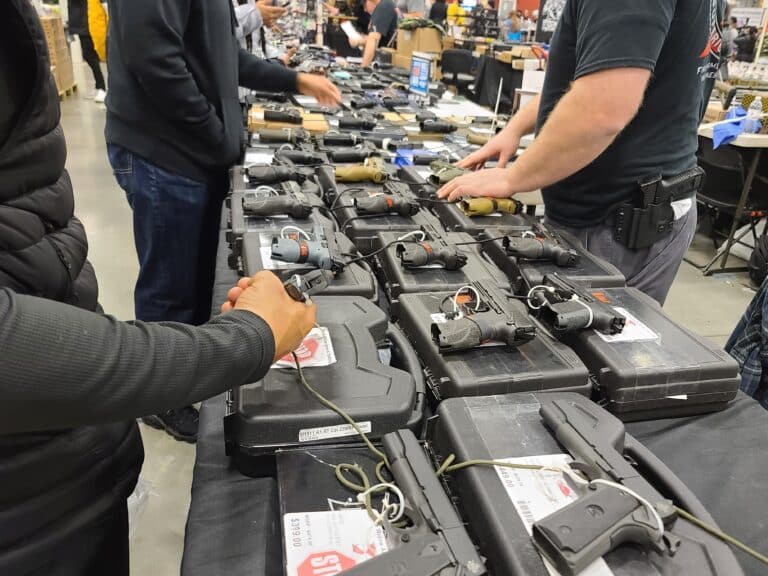The Supreme Court’s latest Second Amendment decision has been relatively impotent since the Court handed it down a few months back. But, this week, it inspired an appeals court to reverse a sweeping ruling against a federal firearms prohibition.
On Monday, a three-judge panel for the Fifth Circuit Court of Appeals unanimously upheld 18 U.S.C. § 922(n), a federal provision barring those under felony indictment from obtaining new firearms. The panel reversed a decision handed down shortly after 2022’s New York State Rifle and Pistol Association v. Bruen. It concluded, largely thanks to the Supreme Court’s subsequent guidance in US v. Rahimi, that restricting the acquisition of guns by those under indictment comports with the “principles that underpin” the nation’s historical tradition of firearms regulation.
“[W]e hold that the government has met its burden of showing that § 922(n) is relevantly similar to pretrial detention at the founding,” Judge Priscilla Richman wrote in US v. Quiroz. “This modern regulation ‘fits neatly’ within our nation’s historical tradition of protecting the public from criminal defendants indicted for serious offenses.”
The decision officially reverses the country’s first-ever ruling striking down the felony indictment gun ban. In September 2022, US District Judge David Counts ruled the prohibition was facially unconstitutional under the Second Amendment. He also dismissed a follow-on charge for making a false statement while purchasing a firearm that hinged on the felony indictment gun ban’s validity.
“This Court is skeptical that the Government here, or in any other court, could defend § 922(n) ‘s constitutionality,” he wrote at the time.
By contrast, Richman’s ruling on Monday emphasized the extent to which the Supreme Court had refined the legal standard Counts relied on when making his decision.
“While Bruen serves as an important guidepost, the Supreme Court’s recent decision in United States v. Rahimi further informs our analysis,” she wrote.
More specifically, she drew attention to Rahimi‘s focus on more general “principles” for analogical support over “historical twins” and its assurance that the law is not “trapped in amber.” She reasoned that those assurances provided greater coverage for modern laws to pass Second Amendment muster, so long as “why and how” a modern regulation burdens a citizen’s gun rights is comparable to past practices.
“Although the government here does not identify a historical law that specifically prevented acquisition of firearms by those under indictment, this lack of a historical twin is not dispositive to our inquiry into the constitutionality of § 922(n),” Richman wrote.
She noted that, since the Founding, the government has disarmed suspected criminals by holding them in jail until they face trial, which “resulted in the complete deprivation of the criminal defendant’s liberty and ipso facto restricted their access to weapons.”
She also argued that Founding-era criminal defendants were often denied bail or otherwise held in jail as a public safety measure, much in the same way Congress sought to protect the public from violent indictees when it passed § 922(n).
“We therefore conclude that the modern purpose of § 922(n) is relevantly similar to the historical purpose of pretrial detention,” Richman wrote.
As for how a person’s gun rights are burdened under each system, Richman again viewed the comparison favorably, noting that both Founding-era pretrial detention regimes as well as § 922(n) are both “temporary restrictions” on constitutional rights that last only while a suspected offender awaits trial.
“Just as § 922(n) restricts the ability of those under indictment to receive new weapons, pretrial detention ‘naturally entail[ed] the loss of a wide range of liberties—including the loss of access to weapons,'” she wrote. “In fact, because § 922(n) restricts only shipping, transporting, and receiving firearms, whereas pretrial detention denied the mere possession of firearms, it could be said that § 922(n) places a lesser burden on Second Amendment rights.”
Finally, the panel rejected the defendant’s argument that many Founding-Era suspects were allowed bail and, thus, not prevented from accessing firearms in the same way § 922(n) automatically requires. Quiroz, who was initially under indictment for burglary when he attempted to purchase a gun, identified six separate states at the time of the Second Amendment’s ratification that allowed bail for burglary suspects. The panel instead identified five states of its own that, at the time, denied bail to burglary defendants. It wrote off the discrepancy as irrelevant by again invoking Rahimi.
“Our historical analysis does not require unanimity in every instance,” Richman wrote. “As the Court explained in Rahimi, ‘[a] court must ascertain whether the new law is relevantly similar to laws that our tradition is understood to permit.'”
To be sure, Rahimi’s impact was not necessarily dispositive. After all, most courts evaluating the felony indictment gun ban post-Bruen and pre-Rahimi reached the same result. Still, the panel’s ruling cites Rahimi nearly as many times as there are pages in its opinion.
Its analytical logic may also embody one of the concerns Justice Clarence Thomas raised in his Rahimi dissent.
“Given that imprisonment (which involved disarmament) existed at the founding, the Government can always satisfy this newly minted comparable-burden requirement,” Thomas argued. “That means the Government need only find a historical law with a comparable justification to validate modern disarmament regimes.”
As a result, a panel from a circuit known for going much farther than its peers in hewing to a strict interpretation of the Bruen test has now okayed a modern gun law based on loose principles related to detaining suspected criminals at the time of the Founding. That’s certainly more impact than Rahimi has had in the majority of cases handled by courts specifically directed to give it greater weight by the Supreme Court.






